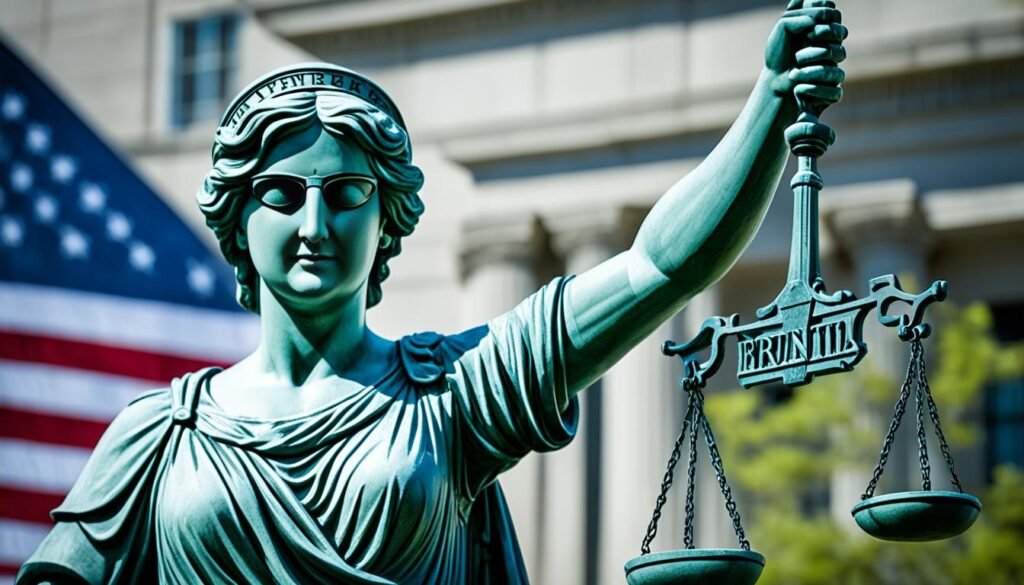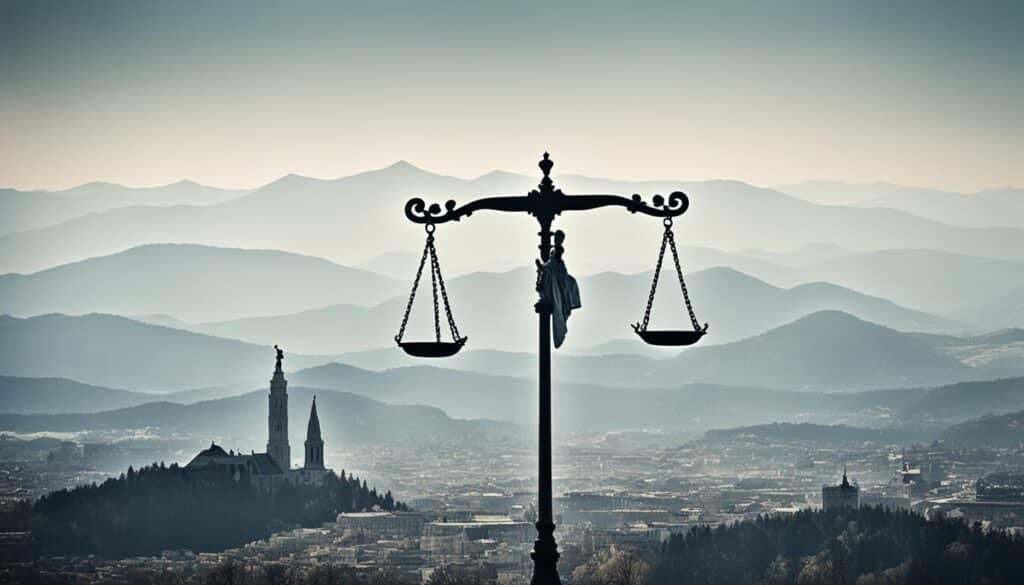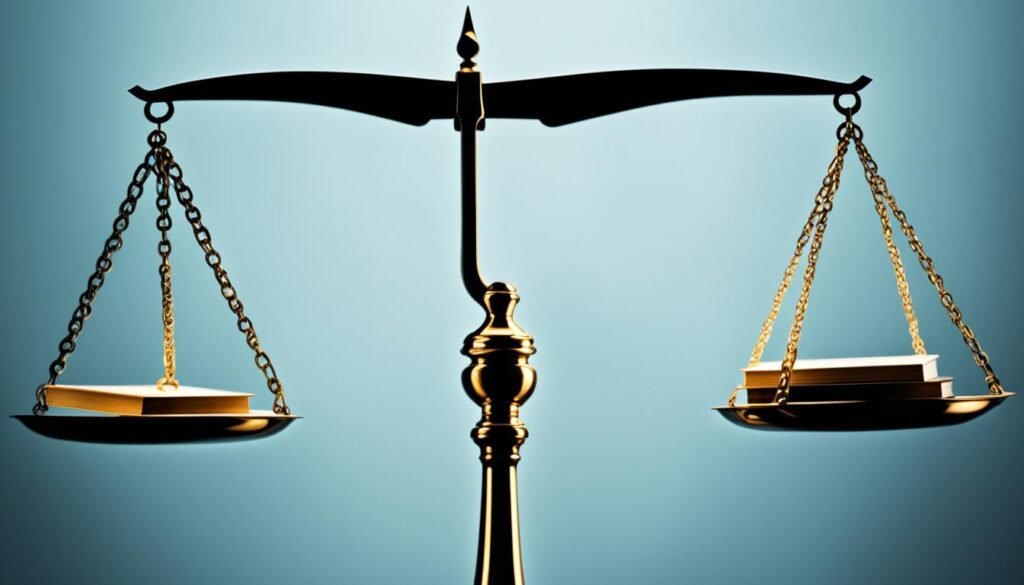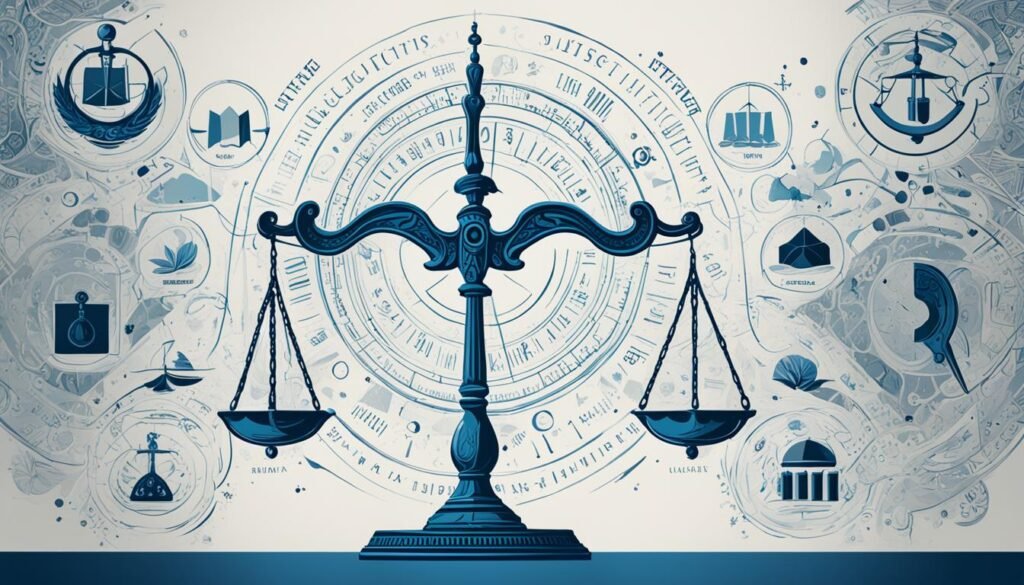The concept of justice is key in morality, law, and politics. It’s seen as a vital virtue and the backbone of social systems by philosopher John Rawls. Justice is about fair treatment and what people deserve. It’s different from virtues like kindness and forgiveness. Philosophers have spent many years exploring justice. They look at what it means, its reasons, and when and how it should be applied.
Also Read: How Does Passing the CPA Exam Impact Your Career?
Key Takeaways
- Justice is a central concept in Western philosophy, dating back to ancient Greece.
- Justice involves how individuals are treated and what they are entitled to, distinguishing it from other moral virtues.
- Philosophers have grappled with the nature, basis, and application of justice, exploring its various dimensions.
- The idea of justice is closely tied to concepts of equality, fairness, and the rule of law.
- Theories of justice have important implications for the design of social institutions and the distribution of social justice.
Introduction to the Idea of Justice
Since ancient Greece, people have been deeply interested in Western philosophy and the concept of justice. Aristotle laid much of the early groundwork. He talked about two types of justice. One is broad, like virtue itself. The other focuses on how we treat each person, what they deserve.
Also Read: The Top 10 Universities Worldwide Offering Scholarships
Romans defined justice as giving each person what they are owed, always and without fail. This shows how justice links with what individuals deserve. Usually, when we talk about justice, we’re talking about our duties and rights. It’s not just about doing something extra; it’s about what’s fair and right.
Justice as a Central Virtue in Ethics and Philosophy
Justice is key among the top four virtues, alongside temperance, prudence, and courage. Philosophers dig into what justice is, its foundation, and how to apply it. They look at its essence and its different meanings in real-life situations. Justice is key in fields like ethics, legal theory, and political philosophy.
Aristotle’s Conception of Universal and Particular Justice
Aristotle described two kinds of justice. One is “universal” and relates to all virtues. The other—“particular”—is about fairly dividing benefits and burdens among a community.
Justice as “Rendering to Each His Due”
The Romans saw justice as the constant effort to give each person what they deserve. It highlights justice as meeting individual needs. This sets it apart from virtues like charity and mercy, which are not necessarily about what we owe.
| Aspect of Justice | Description |
|---|---|
| Universal Justice | Justice as a comprehensive moral virtue, encompassing the entire range of ethical conduct. |
| Particular Justice | Justice focused on the fair treatment and distribution of benefits and burdens among individuals. |
| “Rendering to Each His Due” | The classical Roman conception of justice as the constant and perpetual will to give people what they are entitled to. |
Key Aspects of Justice

Justice is deeply tied to how we treat people and what they deserve. This differs from coming together for a common goal. It also makes duties those can be rightfully enforced unlike charity, which is more voluntary.
Also Read: 10 Best Universities In The World For Scholarships
Justice and Individual Claims
Justice is all about upholding the individual claims of each person. It makes sure everyone gets what they are owed. This focus on personal rights and entitlements is key, setting it apart from other morals.
Justice, Charity, and Enforceable Obligation
Charity is about doing more than we have to. However, justice creates obligations that must be met and can be required by law. This makes justice different from charity’s acts of kindness, which are not compulsory.
Justice and Impartiality
Impartiality and consistency matter a lot in justice. It demands treating similar cases the same way. This stops decision-making that is arbitrary or biased. Fairly applying just rules is a big part of justice.
Justice and Agency
Justice is closely linked with people’s agency to seek what they are due. It isn’t just about helpful organizations or leaders. It stresses that individuals can claim their rights. This sense of empowerment is crucial in justice.
Understanding justice means looking at individual rights, the difference from charity, the need for fairness, and supporting individual action. These elements are important for a deep comprehension of justice.
Also Read: The Secret Advantages Of University Scholarships
Distinctions in Theories of Justice

Philosophers look closely at justice, offering different points of view. This helps us see the full picture of justice and its meanings. Each view guides us through complex theories, showing their effects in real life.
Conservative versus Ideal Justice
Conservative justice wants to keep things as they are, focusing on existing rights and traditions.
Ideal justice dreams of a perfectly fair society. It works to change society based on ethical and political ideals.;
Corrective versus Distributive Justice
Corrective justice is about fixing wrongs and restoring fairness. It’s seen in legal systems seeking to punish for crimes.
Distributive justice is about sharing benefits and responsibilities fairly. This includes how resources are shared in society.
Procedural versus Substantive Justice
Procedural justice ensures fairness in how decisions are made. It focuses on having rules and processes that are fair and consistent.
Substantive justice looks at the fairness of the actual results or outcomes. It checks if decisions made were just and right for all involved.
These distinctions are key in understanding various theories of justice. They help us dive into the details of each theory. By comparing conservative and ideal justice, and other types, we learn about justice deeply.
Also Read: The Evolution Of The Legal System Through History
The Scope of Justice

The question of who justice applies to has been long discussed. Does justice only include human beings? Or does it also cover non-human animals? Some say justice is found in specific relationships or is broader. They argue if justice focuses on how we treat individuals or if it looks at the whole social system.
Human versus Non-Human Animals
Does justice go beyond just people to include animals too? Peter Singer believes in a wider moral view, looking beyond species. He thinks we should consider suffering when deciding who gets rights. But, to some, human abilities to understand morals are key to offering justice.
Relational versus Non-Relational Justice
Is justice tied only to select relationships or to everyone equally? Some, like David Gauthier, think justice is about helping each other out. They say it is at play in specific social and business deals. However, thinkers who follow John Rawls see justice as affecting all of society equally.
Individuals versus Institutions
Does justice focus on individual people or on making fair social systems? Robert Nozick believes in personal rights and says the state should stay out. On the other hand, G.A. Cohen argues for equality, looking at how institutions can be fairer for all. Deciding this helps figure out justice in law, the economy, and helping people.
| Perspective | Justice Applies To | Key Proponents |
|---|---|---|
| Narrow Scope | Humans in Particular Relationships | David Gauthier, Robert Nozick |
| Broad Scope | All Sentient Beings, Institutional Design | Peter Singer, John Rawls, G.A. Cohen |
Justice and Utilitarianism

Utilitarianism, a moral theory, looks at actions based on their outcomes. But it has a tough time including the concept of justice. Justice focuses on the fair treatment and rights of individuals, not just on the overall results of actions.
Some utilitarians say fair rules and ways are good because they help society as a whole. But there’s a problem. Justice also means looking out for the rights and moral claims of each person. It’s not just about what’s good for everyone.
This conflict shows how hard it is to mix forward-looking theories like utilitarianism with the backward-looking ones around rights. Figuring this out is a big issue in moral philosophy today.
Justice and Contractarianism

Western philosophy puts a lot of thought into justice. Contractarian theories have become key in defining it. Philosophers like David Gauthier, John Rawls, and T.M. Scanlon have created major contractarian ideas on justice.
Gauthier’s Contractarian Theory
David Gauthier’s theory says justice should mean mutual benefit. He believes rational people would choose rules that help everyone when they work together. This is about finding rules that make everyone’s life better through working together and setting limits.
Rawls’s Theory of Justice
John Rawls’ idea of “justice as fairness” is different. He imagines a fair agreement that everyone would make without knowing their own life situation. The goal is to make sure everyone is as well off as possible, especially those who start with less.
Scanlon’s Contractualism
T.M. Scanlon’s view focuses on what people can accept as fair and reasonable. He thinks justice rules should be ones everyone could agree on, not just what helps most or one person best. It’s about making rules that everyone would likely say are good, if they thought it through.
These ideas of contractarianism look to make a solid foundation for justice that is not simply about what helps the most people, which is a core idea of utilitarianism. They try to root justice in agreements that any sensible person would make, seeking a more just and even-handed basis for how we treat each other.
Justice and Egalitarianism

Egalitarian theories believe justice means everyone should be equally treated. This can be in how benefits and burdens are given or in everyone’s basic rights. Not all egalitarians think exactly the same. For example, G.A. Cohen supports a type of egalitarianism that fits with differences in people’s effort and choice. Egalitarian ideas are very important in today’s discussions on fair justice.
Justice as Equality
In egalitarian ideas of justice, it’s key that everyone gets the same moral worth and treatment. Proponents say justice means making sure things like wealth, opportunities, and income are shared fairly. They aim for a world where nobody is left behind. This pursuit for equality has fueled many movements pushing for social change and fairness.
Responsibility-Sensitive Egalitarianism
Some egalitarian thinkers argue for a balance between equality and responsibility. They say justice can still be fair while recognizing personal choices and effort. G.A. Cohen and others have shaped this ‘responsibility-sensitive’ egalitarianism. It allows for some level of inequality based on individual traits and choices. Yet, it wants to make sure everyone has the same basic rights and access to essential things. This view sees justice as a way to manage the needs of equality and personal responsibility.
Contemporary Perspectives on Justice

Thinkers today look at justice in new ways. They focus on the rights of minority groups, known as recognition. And they also think about sharing wealth, known as redistribution.
Recognition and Redistribution
Nancy Fraser says justice should consider both cultural and economic sides. The fight for recognition of groups long left out is now key. This adds to the older idea of sharing resources. Finding the right mix is a big challenge for modern justice ideas.
Feminist Theories of Justice
Feminist thinkers have changed how we see justice. They focus on caring, people’s real stories, and fixing big, deep-rooted problems. This is about more than just equal rights on paper. It’s about making everyone’s life better by listening to those who are often ignored.
Also Read: What Role Does Corporate Governance Play In Banking And Finance Law?
Conclusion
The concept of justice looks different to everyone. People have been debating what it truly means for a long time. Even though there’s no single theory about it, this debate has deepened our understanding. We’ve learned more about the moral and political aspects of justice.
Exploring the idea of justice is still very important today. It helps us face ethical and political issues. The ideas from past thinkers about justice guide us. They help us want a fairer and more equal society.
Justice continues to be meaningful because it encourages us. It pushes us to work for a world where everyone is treated well. We aim for fairness and to make sure our systems follow moral and political truths.
FAQs
Q: What is the concept of justice in philosophical and ethical perspectives?
A: The concept of justice involves the fairness and moral righteousness in actions and decisions, balancing rights and responsibilities in society from a philosophical and ethical viewpoint.
Q: How does criminal justice tie into the concept of justice?
A: Criminal justice is a specific branch of justice that focuses on the study of laws, enforcement of penalties for criminal offenses, and the administration of punishment for those found guilty of crimes.
Q: Can you provide an example to illustrate the importance of justice in society?
A: One example that illustrates the importance of justice is the equitable distribution of resources and opportunities to ensure fairness and equality among individuals and groups.
Q: What are some contemporary theories of justice discussed in philosophical discourse?
A: Contemporary theories of justice explore concepts such as distributive justice, restorative justice, and procedural justice, each offering unique perspectives on how to achieve a just society.
Q: How do ethical principles like compassion and dignity factor into the concept of justice?
A: Ethical principles like compassion and dignity play a crucial role in shaping the concept of justice by emphasizing empathy, respect, and human rights in the administration of laws and punishment.
Q: Why is it important to address threats to justice in society?
A: Addressing threats to justice in society is vital to uphold the rule of law, protect individual rights, and maintain social order by preventing injustices such as corruption, discrimination, and abuse of power.
Q: How can one cite references and external links when discussing justice topics?
A: When discussing justice topics, it is essential to cite references and include external links to reputable sources to provide credibility, enable further exploration, and support claims with verifiable information.
Q: What are some key awards or recognitions related to contributions to the field of justice?
A: Some key awards related to contributions in the field of justice include the Nobel Peace Prize, Human Rights Awards, and Justice Awards, recognizing individuals or organizations for their commitment to upholding justice and human rights.
Source Links
- https://www.scu.edu/ethics/ethics-resources/ethical-decision-making/justice-and-fairness/
- https://plato.stanford.edu/entries/justice/
- https://iep.utm.edu/justwest/





